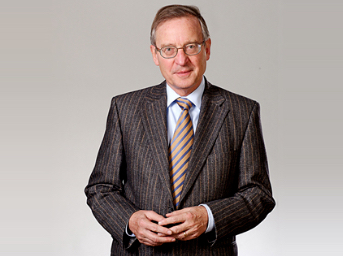Jürgen Donges: The Culture of Stability in the Eurozone
President of the Council of Economic Experts of the German Government.
Jürgen Donges, President of the Council of Economic Experts of the German Government, presented under the title “The Culture of Stability in the Eurozone” the current situation of the Economic Policy of the European Union at an event held at the Casino de Madrid on Thursday, April 1, 2004.
Mr. Donges explained that the third phase of the Treaty on the European Union envisages a mechanism for coordinating the economic policies of the member states through the management of macroeconomic instruments, in other words, through a common economic policy.
The main development of the treaty is reflected in the regulations that constitute the Stability and Growth Pact.
What is the Stability and Growth Pact?
The essential element of the Stability and Growth Pact consists of the commitment of countries to maintain a short-term public deficit below 3% of GDP, and in the medium and long term, a public deficit close to balance or in surplus.
It includes rules on fiscal policy, outlines a procedure for monitoring compliance by Member States, and provides for sanctions for countries that do not meet the agreed criteria.
One fact lamented by Mr. Donges was the suspension of sanctions against Germany and France for their excessive deficit, decided during the early hours of November 25, 2003, by the Ecofin (composed of the economy and finance ministers of the member states). Spain was one of the four countries that rejected this measure, which the then Prime Minister José María Aznar described as “a very sad day for Europe.” The European Commissioner for Economic and Monetary Affairs, Pedro Solbes, also lamented the fact, as did the Minister of Economy, Rodrigo Rato.
The aspect that concerns him most about these decisions is the “moral hazard,” that is: the example set for the new enlargement countries. Reducing the deficit in the long term is difficult and is a matter that should concern the young, as the measures taken now will affect them in the future.
Regarding the enlargement of the EU, he emphasized his skepticism, similar to what happened when Spain joined, which has now become an example for other countries to follow.
The speaker considers that the current situation of the Euro’s appreciation against the Dollar is not a matter that should worry Europeans, as it is no longer within our control. He also emphasizes that companies cannot base their competitiveness on price alone; they must “seek other formulas,” such as those related to quality or technological innovations.
The most important issue is Inflation; controlling it should be the primary objective of the European Central Bank (ECB), and it should not fall victim to political pressures from different governments that are trying to push for measures that would favor their own country. With interest rates currently at 2%, he does not believe the ECB will lower them even though it theoretically benefits Germany, or rather some of its companies. Institutions responsible for economic policy should be more independent from political power.
To conclude, he spoke about the American economy, concerns about unemployment, and whether the very low interest rates could lead it into a situation similar to Japan’s in recent years. The fundamental aspect that sets this economic recovery apart from others is Productivity: technological advances have changed the way we work and productivity has increased. This fear that there won’t be enough work is similar to when during the industrial revolution it was said that machines would destroy the economy of thousands of families. The increase in employment will take a little longer than in other recoveries, but it will happen.

